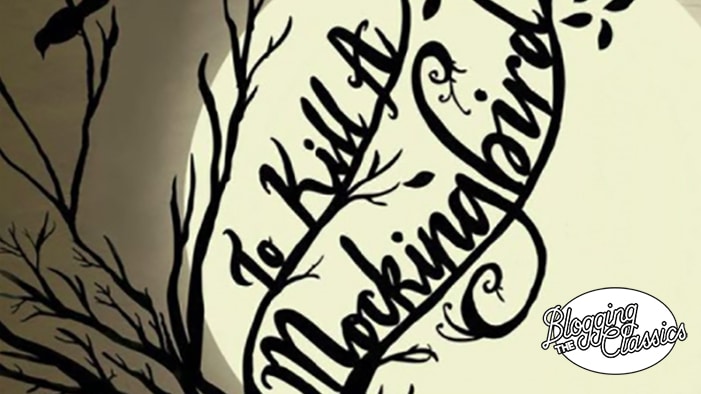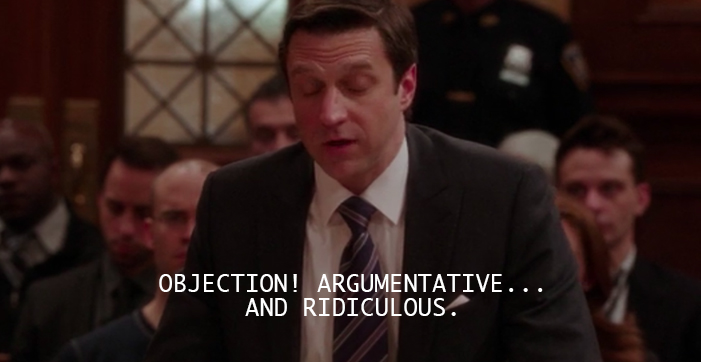Blogging To Kill a Mockingbird: Chapters 16 & 17

To catch up on Blogging To Kill a Mockingbird, click here!
I have spent half my life watching reruns of Law & Order: SVU. (The other half I have spent Googling things such as “how fast does hair grow” and “I know pizza is bad for you, but like how bad?”) So as someone who has watched Elliot Stabler kick down a door more times than I can count, I like to think I know a little something about The Law, and I will use this wealth of knowledge to guide us through the forthcoming trial.
Now, Chapter 16 is mostly just a lead-in to chapter 17, which is when the trial begins, but there are a couple things worth noting.
- Scout asks how Atticus can consider Mr. Cunningham a friend even after what happened the previous night. Atticus tells her that Mr. Cunningham is “basically a good man,” he just “has his blind spots along with the rest of us.” The narrative presents Atticus as the novel’s moral compass, but I’m with Jem on this one: “Don’t call that a blind spot,” he says. “He’da killed you last night when he first went there.”
- Atticus then explains that what happened last night proves that “a mob’s always made up of people.” Atticus says, “…a gang of wild animals can be stopped, simply because they’re still human.” When Scout did what she did—when she asked Mr. Cunningham about his entailment and made polite Southern small talk—it forced Mr. Cunningham to feel shame. Mr. Cunningham is, after all, a human being, and he’s capable of recognizing that Scout, Jem, Atticus are human beings too. Tom Robinson is also a human being, but unfortunately that doesn’t occur to anybody.
Scout, Jem, and Dill go to the courthouse and wind up sitting in the balcony along with Reverend Sykes and the rest of Maycomb’s black residents. And with that, the trial begins.
DUN DUN.

Chapter 17 opens with the sheriff Heck Tate’s testimony. Heck Tate tells the prosecutor what happened: one night, he received word from Bob Ewell that Tom Robinson had beaten and raped his daughter, Mayella.
When it’s Atticus’s turn to speak, he asks Heck Tate if a doctor was called for Mayella. Heck Tate’s response is pure confusion: “It wasn’t necessary, Mr. Finch. She was mighty banged up. Something sho’ happened, it was obvious.”
Apparently doctors can’t help you when you’re sick or hurt. They can only confirm that you are, in fact, sick or hurt. My parents always wanted me to be a doctor and let me tell you, if it were as easy as glancing at someone and being like “Yep, that looks like a stab wound if I ever saw one,” I would have gone to med school in a heartbeat. Unfortunately, as I understand it, doctors have to do other stuff, like surgery. So I became an Internet writer instead, and here we all are.
Atticus asks about Mayella’s injuries. Heck Tate says she was beaten on the left side of her face and had a black eye, and we get to spend a whole page trying to figure out of it was Heck Tate’s left or Mayella’s left before Heck Tate realizes that it would have been on Mayella’s right.
Scout is bored. So far, this has been nothing like an episode of Law & Order. If this were an episode of Law & Order, the defendant would have fired his attorney already and chosen to represent himself. Objections would have been made, withdrawals would have been issued, and the judge would have been saying, “Counselor, control your client!” after every interruption.

Credit: NBC
But then Bob Ewell is called to the stand. He cracks a few jokes before the judge shuts him down and tells him there won’t be any funny business in his courtroom. When the prosecutor asks Bob Ewell to describe what happened the night of the attack, Mr. Ewell causes such a stir with his description that the judge has to bang his gavel for a full five minutes to get everyone to settle down again. He warns them that he’ll clear the court of spectators if people can’t control themselves. SEE IF HE WON’T.
Next, Atticus gets up to question Mr. Ewell. He confirms that Mr. Ewell didn’t call for a doctor, and that Mayella was beaten around the right side of her face.
That’s when we get our first “Objection!” Atticus asks Mr. Ewell if he can read and write. The prosecutor objects, demanding to know what Ewell’s literacy has to do with the case at hand. The judge lets the question stand, but Atticus is on thin ice. Now we’re talking!
Atticus gives Mr. Ewell a pen and asks him to demonstrate. Mr. Ewell does so, to general alarm. The judge stares at him and the prosecutor stands in his chair to get a better look. Turns out, Mr. Ewell is left-handed. As it was the right side of Mayella’s face that was bruised, it follows logically that a left-handed person could have done it easily. Jem whispers, “We’ve got him,” but Scout thinks Jem is “counting his chickens.”
As for me? All I can think is that this went right from Law & Order: SVU to Legally Blonde in a matter of seconds.

Credit: Metro Goldwyn Mayer
NOTABLE QUOTES
When Scout, Jem, and Dill ask Miss Maudie if she’s going to the courtroom to watch, she says no.
“I am not. ‘t’s morbid, watching a poor devil on trial for his life. Look at all those folks, it’s like a Roman carnival.”
THIS AND THAT
- One of To Kill a Mockingbird‘s shortcomings is that it often treats violent, deep-seated racism as a minor character flaw. See: Mr. Cunningham and Mr. Underwood, both of whom “despise” people of color but are otherwise, according to Atticus, “good folks.” It’s the kind off cognitive dissonance we still see today.
- While they’re walking to the courtroom, Scout and Jem see a group of biracial children. Scout asks how he can tell they’re “mixed-race.” Jem says “you just hafta know,” and that “one drop” of “Negro” blood means you’re black. This was called the “one-drop rule” and became a legal mandate in the South when Jim Crow laws were passed. Google hypodescent—it means we tend to categorize those of mixed race into the group considered to be socially subordinate.
- We haven’t seen Mayella yet, but Scout says the only bright spot on the Ewells’ property is a far corner where geraniums have been carefully planted. It’s rumored that these belong to Mayella.
DISCUSSION QUESTIONS
During the trial, Scout and Jem sit in the balcony—the segregated part of the courtroom. Black men and women even stand to give them their seats. This seems to (subconsciously) mirror the way the narrative, throughout the story, allows the Finches to occupy a role that doesn’t belong to them—the one where the Finches are painted as victims of a sort, when in reality the victims are people of color. Agree? Disagree?
Looking for the rest of our Blogging the Classics series? Click here, or you can check out the SparkNote!













